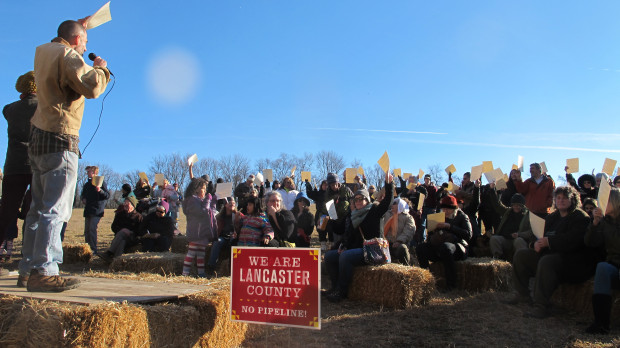Police, protesters prepare for Atlantic Sunrise pipeline construction

Marie Cusick / StateImpact Pennsylvania
Protesters gathered in January to ceremonially burn the environmental impact statement for the Atlantic Sunrise pipeline. More than 1,000 people have signed a pledge to use civil disobedience to disrupt the project, according to the group, Lancaster Against Pipelines.
Police are expected to have an almost constant presence in Lancaster County during construction later this month of the Atlantic Sunrise interstate natural gas pipeline.
Brett Hambright, of the Lancaster County District Attorney’s Office says he’s hoping planned protests against the project are peaceful but, “we’re not naive to the point we think this would go absolutely smoothly and no feathers will be ruffled.”
The pipeline has been a lightning rod for controversy since it was first announced in 2014. Law enforcement agencies, including local and state police, have been meeting since the spring to coordinate.
The $3 billion line is part of a broader network of controversial new natural gas infrastructural projects being built throughout the Northeast to connect natural gas production in the Appalachian Basin to new markets within the U.S. and abroad.
“We’re not going to be out there trying to push people off land,” Hambright adds. “We’re not going to be looking to arrest.”
More than 1,000 people have signed a pledge to use civil disobedience to disrupt the work, according to Mark Clatterbuck of the group, Lancaster Against Pipelines (LAP). Construction on the pipeline began last month, but work is not expected to get underway in Lancaster until mid-to-late October. When completed, the line will go through 10 Pennsylvania counties and carry natural gas from northeastern Pennsylvania southward.
Most of the organized resistance to the project is in Lancaster County. Two local police departments recently sent out questionnaires to landowners along the pipeline route, asking people if they intend to allow protesters onto their properties.
Clatterbuck says LAP has met with local law enforcement agencies and described their commitment to nonviolence, but he’s disturbed to hear some local leaders describe the opposition as coming from outside activists.
“It’s easier for them to try to dismiss this local grassroots effort by framing it as some kind of artificial resistance that’s being staged by some outside group,” says Clatterbuck.
Williams, the company building the Atlantic Sunrise Pipeline, has also been coordinating with police and hired its own private security.
“They’re going to make sure that facilities are protected and equipment is protected to try to prevent vandalism,” says Williams spokesman Chris Stockton. “Our priority to install this safely and ensure our folks are protected and that protesters are protected.”
Most protests that have occurred during the past decade of Marcellus Shale development have been peaceful, says Ryan Tarkowski, of the Pennsylvania State Police.
“Arrests, when they did happen, were typically individual actors for things like trespassing and destroying equipment,” he writes in an email. “There were also instances of people planting explosive devices on equipment but, thankfully, none detonated.”
















